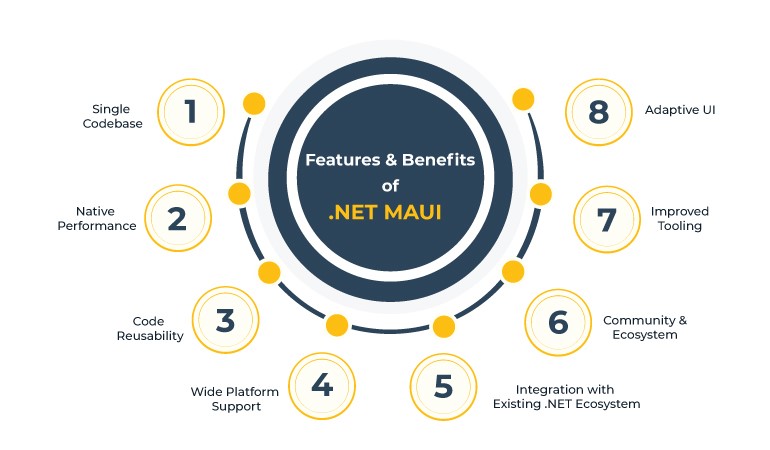Having a robust application has become almost necessary for all businesses these days. Given the rapid digital transformation taking place worldwide, it makes a lot of sense for companies to cement their digital footprint by developing high-performance applications that help them serve their customers and achieve business objectives. MAUI Framework(Multi-platform App UI) is an open-source framework by Microsoft for building cross-platform mobile apps and desktop applications.
It is an evolution of Xamarin. Forms, a popular framework for building mobile apps using C# and .NET.
.NET MAUI allows developers to create native user interfaces and application logic that can run on multiple platforms, including iOS, Android, macOS, Windows, and more. It simplifies the development process by enabling code sharing across platforms, reducing the need for platform-specific code.
This article explores the .NET MAUI application development framework. It also compares other cross-platform app development frameworks with .NET MAUI.
Key Features and Benefits of .NET MAUI
.NET MAUI offers several benefits for developers building cross-platform applications.
Some of the key benefits include the following:

Single Codebase:
With .NET MAUI, developers can write their application logic and user interface code once and share it across multiple platforms. This significantly reduces development time and effort as there is no need to maintain separate codebases for each platform.
Native Performance:
.NET MAUI leverages the native capabilities of each platform, ensuring to deliver high performance applications and a native user experience. It uses platform-specific rendering engines, resulting in smooth animations, fast loading times, and efficient memory management.
Code Reusability:
The code-sharing capabilities of .NET MAUI allow developers to reuse a significant portion of their code across different platforms. This reduces duplication and makes it easier to maintain and update the application.
Wide Platform Support:
The .NET MAUI framework supports a broad range of platforms, including iOS, Android, macOS, Windows, and more. This wide-ranging support allows developers to target a broad audience and deploy their applications on various devices and operating systems.
Adaptive UI:
.NET MAUI makes it very to build adaptive user interfaces (UI). Developers can create UI layouts that automatically adapt to different screen sizes, orientations, and input modes. This ensures a consistent and optimized user experience across various devices.
Improved Tooling:
.NET MAUI benefits from the extensive tooling ecosystem of .NET and Xamarin. Developers can leverage powerful IDEs like Visual Studio and Visual Studio Code, as well as debugging, testing, and profiling tools to streamline their development workflow.
Community and Ecosystem:
.NET MAUI is an open-source framework supported by Microsoft and the .NET community. It has a vibrant community that actively contributes to its development, provides support, and shares resources and libraries. This helps developers access a wealth of knowledge and resources to enhance their applications.
Integration with the Existing .NET Ecosystem:
.NET MAUI seamlessly integrates with the broader .NET ecosystem, including libraries, frameworks, and services. Developers can leverage existing .NET components and take advantage of the vast ecosystem to accelerate development and enhance their applications.
Overall, .NET MAUI offers a streamlined and efficient way to build cross-platform applications, enabling developers to reach a wider audience while minimizing development time and effort.
Comparison of .NET MAUI with Other Cross-Platform App Development Frameworks
Whenever a company wants to build a cross-platform application, it has to undertake a comprehensive comparison of the leading frameworks to decide which one to go with. Your decision to choose one framework over another is determined by your unique business needs, project requirements, development capabilities, and budgetary constraints, among others.
When comparing .NET MAUI with other cross-platform frameworks, it’s important to consider factors such as development experience, performance, platform support, ecosystem, and community support.
Here’s a comparison of .NET MAUI with some popular cross-platform frameworks:
Xamarin:
Xamarin is the predecessor to .NET MAUI and shares many similarities. .NET MAUI builds upon Xamarin, offering a more streamlined and improved development experience, enhanced performance, and better platform support. It is recommended to use .NET MAUI for new projects, as it represents the future direction of cross-platform development with .NET.
React Native:
React Native is a JavaScript framework developed by Facebook. It allows developers to build mobile apps using JavaScript and provides a bridge to access native components. While React Native has a large community and offers good cross-platform support, it requires knowledge of JavaScript and can have performance limitations compared to native apps.
Flutter:
Flutter is a UI toolkit developed by Google. It uses the Dart programming language and provides a reactive framework for building cross-platform apps. Flutter offers excellent performance, a rich set of pre-built UI components, and a fast development cycle. However, it requires learning the Dart language and may have a smaller ecosystem compared to frameworks like .NET and React Native.
Ionic:
Ionic is a popular framework for building hybrid mobile apps using web technologies such as HTML, CSS, and JavaScript. It leverages web technologies to create a cross-platform user interface that runs inside a WebView. Ionic has a large community, extensive documentation, and supports a wide range of plugins. However, the performance may not match that of native apps, and access to certain device capabilities may be limited.
NativeScript:
NativeScript allows developers to build native mobile apps using JavaScript, TypeScript, or Angular. It provides access to native APIs and UI components, offering a native-like user experience. NativeScript has good performance and a strong community, but the learning curve may be steeper compared to other frameworks due to the need to understand native APIs and development patterns.
Conclusion
It’s worth noting that each framework has its strengths and weaknesses, and the choice depends on factors like developer expertise, project requirements, performance needs, and platform support. .NET MAUI stands out for its strong integration with the .NET ecosystem, native performance, wide platform support, and a growing community, making it a compelling choice for cross-platform application development with .NET.
If you want to build a low cost cross platform mobile application for all the mobile platforms, contact us at [email protected]. Our Web & Mobile App Development team will schedule a free session with you to discuss your needs and how we can support you in achieving your goals.

